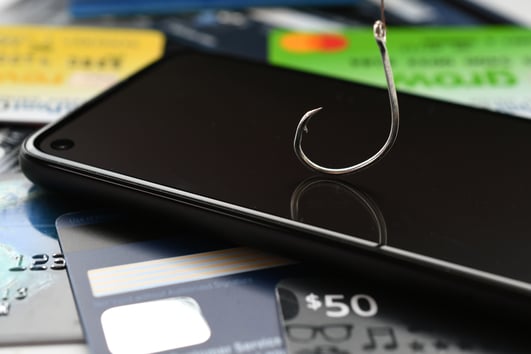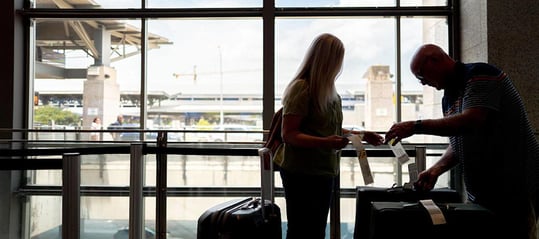 Between November and December, whether for work or the holidays, flights can be the most stressful part of anyone’s day when traveling. In most cases, arriving at the airport means keeping up to date with flight times, terminal changes, boarding times, checked luggage, TSA security, and arriving hours before your flight just to get through all checkpoints efficiently.
Between November and December, whether for work or the holidays, flights can be the most stressful part of anyone’s day when traveling. In most cases, arriving at the airport means keeping up to date with flight times, terminal changes, boarding times, checked luggage, TSA security, and arriving hours before your flight just to get through all checkpoints efficiently.
As stressful as it is, scammers are weaponizing the high emotional stress circling around flight schedules and doing the extra digging for your checked bag tags. Coming down the runway, travelers must be aware of fake airline texts, emphasizing cancelled flights and changes to be made expeditiously. With the world we live in, it’s best to keep your flight itinerary, luggage tags, and ticket information to yourself.
What's Going On?
It’s a couple of days before your trip and you receive a message from your airline notifying you about flight updates; your flight has been cancelled. You’ve been waiting for months, got PTO off, you deserve a break and now there are some ‘issues’. Behind the veil of the cancelled airline text, scammers are waiting to lure you to them instead of legitimate customer service reps to resolve your updated flight plans. They claim to assist you in rescheduling your flight to an earlier or later time, but their goal is to steal your personal information and credit card information, leaving you devastated and now without a flight.
How This Scam Works
The scam that is a structured social engineering attempt, starts off with a text message impersonating your airline, which includes the following:
- Your flight number
- Your name
- Link to phone number
- Urgent language to get you to act NOW
- “Click to rebook” dynamic

Seeing anything with the word cancelled will put anyone into crisis mode to quicky resolve issue. While trying to quickly resolving the issue you think is present, this may leave no room for rational decision making - this is what makes us human in times of urgency. Once you get on the phone with an ‘airline agent', they confirm the flight times have changed or cancelled overall. To fix, there will be a fee to rebook your cancelled flight. Being cooperative, they ask for personal details like your name and passport number. Their social engineering attempt goes so far that they will also send a follow up confirmation number of updated flight to make their attempt more believable, playing with your head and emotional state.
Ways They Make Social Engineering So Real
Whenever scammers do the extra digging for phishing attempts using articulative social engineering techniques, they will use an organization’s logo, AI tools to make their messages appear human with no grammatical errors. On top of grammar, utilizing urgent language to make an irrational decision as they know this is important to you. As someone who is expected to travel to see family, close to home, we even experienced these fake airline texts. Thankfully in this instance the airline fake scam text had inaccuracies, indicating it was a scam. But it is still alarming to receive the text nonetheless as some may not be so lucky to recognize the signs.
Steps to Protect Yourself and Travelers
When you receive a text claiming your flight has been cancelled, do not panic! Do the following to confirm and protect yourself:
- Verify directly with your airline!! Since scammers will mimic the websites needed to update flight times, it is always best to check directly with your airline, whether it’s in the App or logging in online. I usually choose to check in the app before believing texts.
- If in the instance you do need to speak with customer service, call the number located within your confirmation email rather than text message sent from scammers. Real airlines do not change their contact information mid-trip.
- Always remember, take a deep breath, take a minute to look at the messages and understand their urgent language is meant to rush you. Checking verified information will save you a world of financial stress and costly mistakes.
- Lastly, gift card scams are also on the rise too (as seen in our previous blog), airlines will NEVER ask for gift cards as a way of payment or any of your banking information
Technology and scams are evolving at a significant rate, but awareness and taking a moment to step back and think will be your best friend in getting yourself out of tight situations.
As we discussed fake airline text scams this heightened traveling season, your checked baggage tags are another target for concern.

Luggage Tags Not Safe from Identity Theft
When traveling, not only do you worry about your boarding pass, sometimes you may have carry on and luggage placed within the overhead bin. It is always within reachable distance and doesn’t always need a luggage tag the way checked bags do when traveling.
According to a reddit user, those that have luggage tags should discard them safely at home and not at the airport OR hotel when you have reached your destination.
Why may you ask? Scammers will literally dig through trash and check bins for discarded luggage tags. The ones you place on your checked bag handles or small stickers on the perimeter. Their goal: to send out claims of lost luggage items that aren’t missing items. All for luring unsuspecting victims to make actions and decisions they do not need to.
Though the information on luggage tags is to help airlines locate your items and place them in the correct plane/conveyer belt, there is also enough information for scammers to impersonate you and attempt reimbursement on missing items that aren’t genuinely missing.
The arising issue, this is becoming a more common experience with airlines and even canceling out those that have genuine missing claims amongst scammers using for financial gain.

How To Stay Vigilant During Flight Scams and Identity Theft
As scammers use fake cancelled airline texts to get you in a heightened emotional state to make a quick decision, the same can be given for your checked bags. To stay safe from identity theft attempts while travelling:
- Boarding pass holds a lot of essential travel information. Keep that information hidden away from wandering eyes until it needs to be shown to a flight attendant.
- As much as you may enjoy posting social media updates of a trip you’ve been looking forward to or the holidays, don’t post images of your bags or boarding pass. You may never truly know who is watching.
- Don’t discard any essential boarding flight material until after you are home, this also includes hotels. Hotels can be a sign of decompression but it’s essential to keep all paperwork from your trip safe until you’re home. Preferably shred it if possible.
- Only take what you need when traveling. If you’re traveling in the US, you don’t need your passport, your driver’s license will suffice (just make sure is a Real ID and that it is not expired or expected to expire when on your trip!) If you do not plan on using devices, best to leave them at home in a safe place.
- Do not use the airport’s Wi-Fi to check for sensitive information about yourself. Since many are sharing the Wi-Fi, who knows what someone can pick up on the Wi-Fi.
- Do not use the public USB charging ports. Use your own personal charging cable connected to a power outlet, not a USB port, or use a USB filter that can transmit power only to ensure no data is transferred while charging your devices.
As much as the following may come off scary, the best thing you can do is have a plan, take a deep breath and take a few precautions to have a safe trip.
Not Always Business IT, But IT To Help Spread Awareness in Heightened Times
As holiday travel ramps up, so do seasonal scams, especially fake airline text alerts and counterfeit luggage tag messages designed to trick travelers into sharing personal information.
Our Ekaru tech engineers play a crucial role in spreading awareness by educating employees and customers about how these scams work and what red flags to watch for in socially engineered texts.
From suspicious “flight change” texts to dubious bag-tracking links, cybercriminals are getting more creative, but with the right guidance, people can stay one step ahead.
Ekaru can help decode these threats, provide real examples, and offer cybersecurity awareness training that goes beyond what you may see in the office, but also prepares you for real-world real-time examples. Everyone deserves to feel confident navigating digital communications during the busiest travel season of the year.
To stay protected, travelers should avoid clicking on any unexpected airline or luggage-related links, verify messages through official airline apps, and enable multi-factor authentication on travel accounts. While we help with small to medium-sized businesses by monitoring suspicious activity across multiple devices, we also empower users by offering short training refreshers, distributing scam-spotting checklists, and reminding folks how to report suspicious messages. Staying vigilant is the best gift you can give yourself this season.
If you want help boosting your organization’s security, that will also transfer over into traveler safety, reach out today, Ekaru is here to help protect your business and people wherever their holiday journeys take them.
.png)